Student Profiles
Program alumni are the best resources for students interested in going abroad, and they are available to answer your questions. If you would like to talk to a recent student about their experience in Uruguay, get in touch with the advisor, Alessandra Capossela.
Yaa Bame, Duke University
The palm trees close by the coastline in Montevideo reminded me of my home state of Florida, even though I was in an unfamiliar place. The winter, on the other hand, was bitter, and during those first weeks, it was hard to imagine feeling fully comfortable in a new place that was so different. As the seasons slowly shifted, so did my relationship with the city. Montevideo began to feel less like somewhere I was just visiting and more like somewhere I was living.
That sense of belonging grew through small, everyday moments. Taking the bondi to classes and to my internship became part of my routine. Long walks along the rambla and eating torta frita on rainy afternoons with friends added to that sentiment.
Following the language pledge was one of the most rewarding parts of my experience. Making friends, taking classes at Universidad ORT, conducting interviews for my internship at a local radio, and interacting with Uruguayans propelled my language skills to new heights.
Middlebury’s program was perfect for me because it offered the right balance of support and independence. By the end of my time in Montevideo, I left having grown academically, socially, professionally and linguistically.
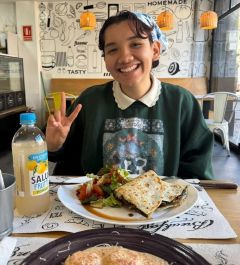
Ashley Huesca Lagunes, Wellesley College
I adore travelling, meeting new people and always expanding my knowledge. I have had the privilege of visiting multiple countries with this goal in mind, and each one of them has offered something new. Uruguay, however, is the only nation that has rivaled my love for my home country, Mexico. Montevideo is the only city that I have seriously considered living there for a couple of years, maybe while pursuing a master’s degree or after my retirement. Much of this appreciation comes from the people. The friends I made in these past few months supported me, made me laugh and engaged in deep philosophical conversations that changed my perspective. These amazing people have carved a space in my heart and I will cherish our connections from now on. Surprisingly, even my acquaintances or the vendors at the farmers market convinced me to go back to Montevideo. Their calm and supportive demeanor translated in a “tranqui” every other sentence was just what I needed after living in the hectic hustle-culture-centric US for the past couple of years. The free museums, popular art exhibitions, street concerts and la rambla are also added bonuses. Four months is in no way enough time to discover everything that Montevideo has to offer. But for me it was more than enough to fall in love with this city and its people. I just left and I am already planning my next trip back.
Kate Goldberg, Tufts University
I could not have imagined a better place to study abroad than Montevideo, Uruguay. Whether I was sharing mate with a friend, walking on rambla at sunset, spending time in my host mom’s art studio, or listening to candombe in Barrio Sur, I felt completely immersed in daily life. At the end of my five-month exchange, Uruguay truly felt like a second home.
In addition to Middlebury’s culture course, I studied at La Udelar, Uruguay’s public university. Being the only foreigner in the classroom wasn’t always easy, but the Spanish-speaking academic environment was extremely fulfilling. Outside the classroom, Uruguay offered countless cultural and creative opportunities. As a violinist, I was able to find incredible musical opportunities—joining an ensemble, taking classes at the national arts school, playing with a local band, and even recording in a professional studio. These kinds of connections happened naturally in Montevideo, where people are so genuinely friendly and open to sharing their culture. I loved exploring other parts of the country along the coast and in the interior, eating dulce de leche, and attending delicious, Uruguayan asados. For anyone looking for full language immersion, a welcoming community, and a hidden gem in Latin America, Uruguay is the perfect country for a semester abroad.
Renée Butler-Jancose, Middlebury College
When I first arrived in Montevideo, I almost immediately wanted to leave. Five months later, I love it so dearly that I can hardly imagine going home. Since August 2024, I have been on my first trip out of North America, a five-continent, nine-country odyssey which culminated in Uruguay. Contrary to my expectations, the Oriental Republic challenged me like no other destination, precisely because I expected it to be the easiest one. Once I stopped treating it like it was Cameroon, Turkey, or France, and saw it as a unique place where life is nothing like I have ever seen, did I begin to fall in love with it.
My infatuation with Montevideo more or less began when my first friend in the country (hi, Lili!) introduced me to the underground countercultural scene. In my first punk show in Jacinto Vera, an otherwise quiet barrio, I finally met people with whom I felt recognized and loved: non-binary tattoo artists, queerpunk guerrilla clothing designers, bohemian artists from across Europe and Latin America, traveling jugglers whose lives were saved by the scene, and so many more, old and young, rich and poor, ‘good’ and ‘bad,’ from all across the world. Beyond my deeply enriching and interesting academic commitments in the University of the Republic, and my serious professional commitment to my internship in an avant-garde private high school, it is this rich tapestry of social life—and the new life that it allowed me to live—that was the shining star of my semester. To this shining star, I say: hasta siempre, Montevideo querido.
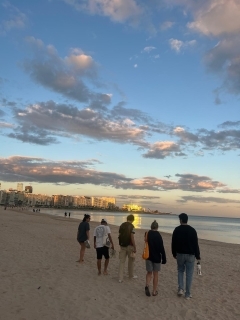
Abigail Johnson, Tufts University
It’s not an exaggeration when people tell you that the lifestyle in Uruguay can be summed up in one word: tranqui. Tanquility effuses from this city, seeping into many aspects of life here. It’s present on Saturday mornings on the rambla, when the bustling flurry of runners co-exists with the sunbathers at 9am. It’s present Monday nights as hundreds of souls sit and watch the sun lower in the sky on the hill at Playa Ramirez. It’s in the purple blossoms of the trees that dot the streets and the beachy prairie that awaits just outside the city. That said, the city breathes with Uruguayan energy: candombe in the Barrio Sur on the weekends, infinite food festivals, quaint bars as well as clubs, honking omnibuses, and students of diverse career paths strolling to their various classes.
With that introduction, allow me to tell you about my semester in Uruguay. I lived in a residential neighborhood of the city mere steps from the Rio de la Plata. On mornings when I don’t have class, I most always take a run on the rambla, where I encounter runners, cyclists, roller-skaters, strollers, exercise groups, and of course, dogs. I took three classes at the Humanities Faculty of the University of the Republic, Uruguay’s largest, oldest, public institution of higher education. Tuesday through Friday, I’d hop on the bus to my morning class, do work in the library of one of the faculties (often outside), and head to my guitar classes or my internship before returning for a second class later in the evening. Oftentimes me and some friends would plan little activities throughout the week (dinners, movies, music). On the weekends, I would head to my run club, which has been such a great way to meet people and then onto whatever plans we had made. These plans included food festivals, concerts, weekend trips within Uruguay, beach days, farmer’s markets, futbol games, etc. I’ve found that there is always something to do as long as the weather is decent.
As my semester in Montevideo comes to a close, I can conclude that I am extremely pleased to have spent this time here. As a smaller city, I feel like I have an intimate relationship with this place and its people, one that will only deepen in my second semester here. The people are kind, the sweets are delicious, and if you live in Uruguay, it is a place you will always know. For those that prefer a quieter city life, one that is equally connected with nature as with streetlights, I believe they can make themselves a beautiful life here on the shores of the Rio de la Plata.
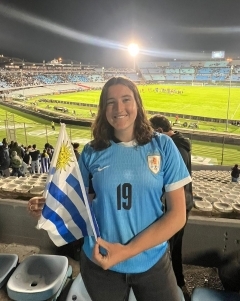
Willa Laski, Bates College
I had a wonderful experience studying abroad in Uruguay in the Middlebury program. I found that life in Montevideo and with Middlebury struck a perfect balance between classroom learning, becoming a citizen of the city, and exploring the region more broadly. I felt academically challenged to constantly improve my Spanish through the language pledge and our weekly Middlebury classes. I felt encouraged to broaden my horizons by travelling around Uruguay and to Argentina. But most importantly, I felt that I really got to know Montevideo as a city. Through new friendships, clubs, personal exploration, going out on the weekends, and developing a weekly routine, I was able to truly become a citizen of the city for the semester. In this sense, I think Montevideo is a perfect city for studying abroad. I have personally never lived in a city before, so I was a bit intimidated by some of the other, larger cities that were proposed as study abroad destinations. Montevideo was the perfect size for me: I felt pushed out of my comfort zone, but I always felt that city life was manageable. For other students like me who are less accustomed to city life, I highly recommend Montevideo as a study abroad option. Studying abroad is all about experiencing something new and different, and Montevideo provided this opportunity for me in an enriching and enjoyable way.
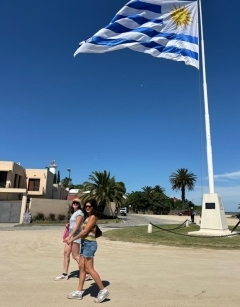
Sophia Gaitanis, Tufts University
From my experience studying abroad, I truly feel like Uruguay will always have a piece of my heart. Although it’s a small country, the people here have big hearts and have always gone out of their way to make me feel welcomed. I’ve loved taking part in the simple pleasures that Uruguayans often enjoy, like drinking mate on the Rambla at sunset, dancing candombe in the streets, or spending my Sundays searching for antiques or books at the Tristan Navara Feria. It’s not uncommon that I would see someone I know running on the rambla, at a concert, or out buying groceries— these were things that always made me feel like I was not so far from home. The time I’ve spent with my host family, the Middlebury staff, members of my tango class, and students/professors at UDELAR has not only led to drastic improvements in Spanish but also strong connections that have enhanced my experience studying abroad. I will always miss the sense of tranquilidad, overwhelming generosity, and remarkable beauty that I have found in Uruguay and Montevideo. My time studying abroad here has been an unforgettable experience and I already can’t wait to be able to return.
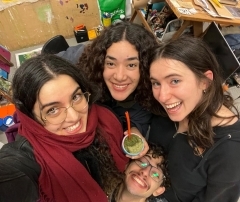
Sorina Johnston, Middlebury College
I selected the Middlebury’s program in Montevideo hoping for an intimate, supportive, immersive study abroad experience, and it was all that and more. As I met other study abroad students from other programs, I realized how much I’d lucked out with the Middlebury program and the incredible support and opportunities it provided. I was not just an exchange student: I was living there, making friends with locals, and simply living as a local. The challenge of truly living as a local was difficult but worth it. By the end of my semester, I’d realized I’d made long-lasting connections and had a deeply unique experience living abroad.
I can’t recommend enough taking the Language Pledge seriously. Spanish went from being something I’d learned in high school and college to a fluid part of myself, with a whole personality of its own. I realized that confidence is the most important part of learning a language - being willing to simply speak and express yourself, even if you might not do it perfectly every time. My Spanish fluency is easily the aspect of my time abroad I’m most proud of. That, the resilience I grew, and the little piece of Montevideo that I carry in my heart. I was so warmly received by the loving and elegant Uruguayan culture, and I’m jealous of anyone who might cross paths with the people who made my time in Montevideo so special. It is kind of a small town, in some ways, and chances are, you will - whether you know it or not.
Key advice: Surrender to the fact of challenge but don’t give up. Keep seeking connection and taking advantage of the culture, events, and experiences around you. Be relentless in finding community.
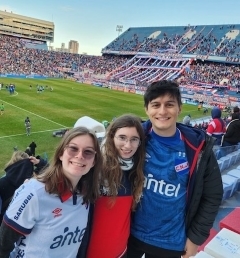
Anne Friedman, Scripps College
I went to Uruguay in Spring 2024 and had a fantastic time. Sylvia is an amazing assistant director who makes you feel at home and comfortable in a new, foreign environment. She does a great job at finding host families and living environments to suit each student. I was placed with a mom and her daughter which was super nice. I was able to learn about Uruguayan culture through them and they were helpful in orienting me the first week. I got to try food like milanesa and had merienda with them, but I also got to eat a ton of other amazing food like lasagna (that was my favorite), pasta, stew, and more.
I took classes at ORT Uruguay: one engineering course (Artificial Intelligence) and two communications courses (Photography and Ethics). I loved my AI class and the other two were also interesting and helped orient me more to Uruguay. I made friends in two of my classes and got close to my professors. It was super easy to ask professors for help if needed. I also took an art class that Middlebury found for me, which I loved and was a highlight of every week.
Through the ORT Uruguay mentor program, I was assigned two mentors which was helpful to meet locals, but then through classes I made friends who I spent the whole semester with. I loved being friends with Uruguayan students because I was able to speak and improve my Spanish as well as learn about the community and culture.
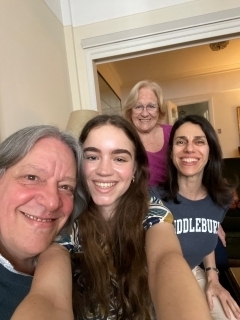
Misha Meyer, Tulane University
I initially became interested in Middlebury’s programs because I wanted to have as immersive a study abroad experience as possible—I saw this reflected in Middlebury’s Language Pledge, enrollment alongside local students, and accommodation with a host family. I had always dreamed of going to Uruguay and felt ecstatic that a program like this existed there. Even having such high expectations, my fall semester abroad was better than I could have hoped.
I studied at the Faculty of Psychology at UDELAR (the public university). I was able to enroll in both larger foundational courses and upper-level seminars, which gave me a taste of the range of educational offerings at my institution. Whereas my home university has a more research-oriented psychology department, I was excited to be able to take coursework that was more oriented towards practical clinical application, which is my desired career path. My internship paired nicely with this application-based coursework: I was a psychology intern at Políclinica Crottogini where I organized activities for different groups at the clinic, including the Quit Smoking support group and adolescent workshops.
As an extracurricular, I decided to explore the world of tango dance and milongas. Every Saturday evening, I went to a beginner’s class at a studio downtown. I ended up loving it so much that, beyond the first paid month of classes, I continued going for the rest of the semester and even performed in the end-of-year showcase! Using my experience from class, I was able to participate in the tango culture around the city: Joventango, the regular outdoor milongas, and the Queer Tango festival in December.
Finally, one of the most enriching aspects of my study abroad experience was my host family. I loved getting an inside perspective on local customs, rhythms, holidays, and cuisine. My host family and I became best friends and honorary family. I still keep in touch with them on a regular basis and hope to visit them again soon!
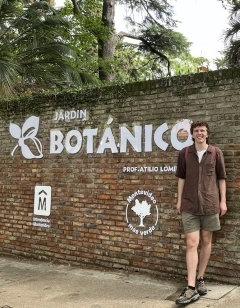
Noah Sweder, Tufts University
Uruguay was a fun and lively place, especially when it was warm out. “La Rambla” was always packed with people and mate for a sunset, and you could always find live music, a theme at a club, a talk at the university, or something else to do. It definitely lacked the cultural and racial diversity I’m accustomed to in the US, but the warm environment and general kindness Uruguayans have was very nice. My main goal was language immersion and the way I was able to really improve my Spanish was through making friends with Spanish speakers, and just speaking and hearing Spanish 24/7. I found it was surprisingly easy to get through a day speaking basic Spanish, but being reliant on speaking Spanish to socialize (as opposed to speaking English with friends) was the best thing that came out of the experience.
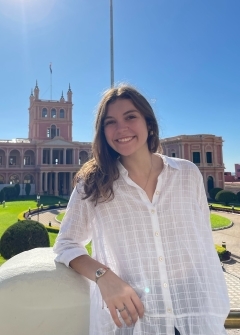
Sophia Young, Tulane University
I had the incredibly enriching opportunity to study abroad with the Middlebury Program in Montevideo, Uruguay. By directly enrolling in the Universidad de la Republica, maintaining Middlebury’s language pledge, and staying with a host family, I immersed myself in Uruguayan culture and grew on both personal and professional levels. I also participated in an internship with the Ministry of Education and Culture, through which I had the opportunity to travel to elementary schools on the Brasil-Uruguay border and teach classes about multicultural and immigrant identities.
Though it is a small, often overlooked, country, Uruguay has so much to offer. From Sunday afternoon Candombe to freshly made medialunas, the city’s juxtaposition of ‘tranquilidad’ and adventure make it an irresistible place to study abroad. My time abroad took me out of my comfort zone, challenged my perceptions of the world, and helped me improve my Spanish skills immensely. My best advice for a student embarking on their Uruguayan journey is to say yes to everything. Go on a spontaneous day trip to Punta del Este, grab lunch between classes with local university students, wake up early to see the sunrise on La Rambla. Immerse yourself in Uruguayan culture by learning from locals, and live every moment to the fullest, because it goes by faster than you think!
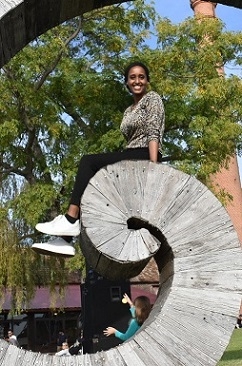
Zena Ebrahim, Swarthmore College
After having completed a Middlebury language program several years ago, I knew that I had to do another. I chose Middlebury for the same reason most passionate language learners do – the appealing language pledge. The language pledge is truly unique; it isn’t just about learning a language faster, but rather becoming a part of the environment we are living in, the people we are surrounded by, and the authentic experiences we hold.
When I arrived in Montevideo, I didn’t know what to expect. But I did know that this experience would be totally out of the ordinary. I knew that it would be difficult. But I equally knew that every difficulty and moment of wanting to give up would contribute to the most unimaginable feeling of success.
The biggest lesson I have learned from Middlebury is that we don’t just learn from teachers, books, or sitting in class. We learn from experiences. And the experiences I have collected the past 4 months are inexplicably authentic and pure. From being in classes with 70 year old adults to being an assistant teacher to very young children, the range of perspectives I’ve gained are honestly mind blowing.
I enrolled in “Bellas Artes”, the Fine Arts college of the public university with no artistic background. I figured that if I were to step out of my comfort zone, I may as well leap. The informality of the classroom truly gave me a space to learn from others. It encouraged me to use the language skills I’ve acquired and converse endlessly. It granted me the perfect opportunity to ask questions fearlessly. And it gave me a space in which I can work creatively, process my experience here as I live it.
As I head back to the states in just a few weeks, I now have a totally new set of eyes to see the world through. A new tongue that can use with greater confidence, experience, and life-changing stories to tell. And best of all, a new set of parents I can call “mom” and “dad”. My stay here wasn’t just the completion of a program, it was the beginning of a new story that I know I’ll be back to finish.
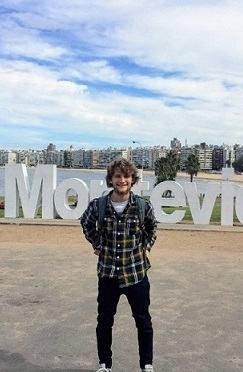
Hubert Ford, Amherst College
I first saw Montevideo through the eyes of Uruguayan poet Mario Benedetti. “Al sur, al sur, está quieta, esperando, Montevideo…” His words painted a picture of a tranquil coastal city, rich with culture, but they also told of the still unresolved trauma Uruguayans face from the dictatorship in the 1970s and 80s. Reading Benedetti’s words, I knew I had to experience the culture and study the history firsthand.
To an outsider, Montevideo may not seem like the quiet city it’s made out to be. At least that was my impression when I first arrived at my apartment in barrio Cordón right off the main avenue 18 de Julio. I was surprised by the bustle of the city: the street vendors, omnibuses, and the activists handing out fliers in the plaza. Montevideo truly teemed with things to see and places to explore from the museums and art galleries to the parks and bookstores and even the house of a 20th century alchemist. And everything was just a short walk or bus ride away.
Nevertheless, speak to any Uruguayan, and they will tell you Montevideo is “chico y tranqui,” and—after spending almost half-a-year there—I have to agree. Montevideo was a like one big neighborhood. It seemed like everyone knew each other. Walking down the Rambla along the coast or through Parque Rodó, I would run into friends and classmates “charlando” and drinking mate, a traditional infusion drink that I am now hooked on.
By far my favorite part of my experience in Uruguay was the university. I studied history and literature in the humanities department of the Universidad de la República, where I was taught by some of the best professors Uruguay has to offer. Furthermore, since the university is free, the student body is incredibly diverse. By chatting with my classmates, I was not only able to immerse myself in the language but also learn first-hand about Uruguayan culture and history.
Montevideo really is the stuff of poetry: unique and vibrant but grounded and visceral at the same time. There are still many open wounds, but the people actively try to progress and improve the city. In my opinion, there is no better place to immerse yourself in language, culture and history than Montevideo.
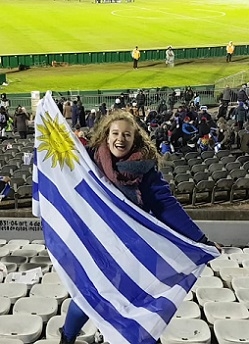
Hollie Haigh, Middlebury College
After one month in the capital city of Uruguay, I knew I needed to cancel all plans that I had to go elsewhere the following semester. I was having such a good time that that I couldn’t bring myself to leave Montevideo after just five months. Montevideo is such a unique and laidback city with a lifestyle that I am so lucky to have experienced this year.
As a Spanish major, one of my biggest priorities when choosing a place to study abroad was being somewhere that I could take The Language Pledge seriously and be speaking as little English as possible day to day. Here, I have found that to be very true. In general, not many people in Uruguay are fluent in English which really forces you to be immersed 24/7. In other parts of the Spanish speaking world that I have visited, at the slightest sense of an accent in shops or restaurants, the initial reaction for people was to respond to me in English but that simply doesn’t happen here in Montevideo which has really pushed and helped me with my linguistic development. I would now confidently consider myself bilingual.
This language development has been facilitated through a number of key experiences, most notably are my host family, my classes and my internship. For the whole year I have had the pleasure of staying with an incredible family who welcomed me with open arms as if I was one of their own daughters from the beginning: we have formed a lifelong relationship that I will always cherish.
Another great thing about being abroad for the full year was that I had the opportunity to experience both public and private education here in Montevideo. At first, I went to la Universidad ORT, a private university, and then on to the public university, la Universidad de la República, which encourages people of all ages and backgrounds to come and study. It was so enriching to see this kind of diversity in a classroom environment, in my Uruguayan Literature class I sat with a retired doctor on one side, an 18-year-old writer on the other and a nun from the Czech Republic in front of me.
Whether it’s being offered a full-time job at a tech company, performing music and dance on the bus during my daily commute, buying lampshades in some random antiques shop or falling off a bus and breaking my ankle on the way to my Zumba class, these are all real-life situations that I have been able to navigate in a foreign language, in a country I’d never been to before, 7,000 miles away from home. For me, this just speaks to how fabulous Middlebury’s program in Uruguay really is and highlights the support and care that we get from the on the ground study abroad staff who are just absolutely excellent. Sylvia Murninkas is the most well connected, genuine and caring coordinator I have ever had the pleasure of working with and has really made my Uruguayan experience what it is.
I am so grateful for the time I have spent in this wonderful country, getting to know its equally wonderful people and culture. I’m very sad to be leaving and already cannot wait to come back to Uruguay. I can’t encourage others enough to consider studying abroad in this incredible country that is so often overlooked!
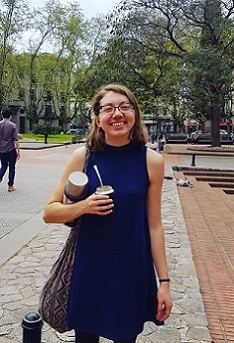
Brooke Moree, Colby College
My time in Montevideo, Uruguay with the Middlebury program was a transformative semester that helped me further explore my interest in activism and gain the hard skills necessary to continue pursuing this interest professionally. I have always been interested in social issues and, because of that, the program helped me gain an internship with Cotidiano Mujer (Everyday Women), a feminist non-profit organization. While working there, I met inspiring women who created the feminist movement in Uruguay. I also helped organize impactful events. For example, I helped with the logistics and interpreting the 16th Encuentro Feminista Latinoamericano y del Caribe (16th Latin American and Caribbean Feminist Conference), which is the largest Feminist Conference in Latin America. This experience not only fulfilled my personal goals of becoming more involved in activism, but also taught me important skills on how to create and run an event with more than 2,000 people participating.
On top of this experience, Montevideo provided a vast amount of resources to get involved in the country’s most prominent social issues. Montevideo is the epicenter of everything going on in Uruguay and is small enough to allow easy access to participate. Because of this, the friends I met in university were already involved in local activist events and they were friendly enough to let me participate with them. I was also able to connect with a scholarship program for high school students and spend the weekends helping organize educational activities. These pastimes greatly improved my knowledge of social issues in the region and my Spanish.
Overall, Middlebury in Montevideo gave me the resources to directly pursue my interests. I could not imagine a better way to spend my junior fall and I know the skills is gained in Montevideo will transfer to what I want to pursue professionally.
